Key takeaways:
- Understanding ethical sourcing involves recognizing the impact of purchasing decisions on fair labor practices and environmental sustainability.
- Key principles include transparency, fair labor practices, environmental sustainability, community engagement, and quality control, fostering consumer trust and better products.
- Challenges to ethical sourcing include lack of transparency, increased costs, and difficulties in measuring positive impacts, necessitating strong supplier relationships and regular audits.
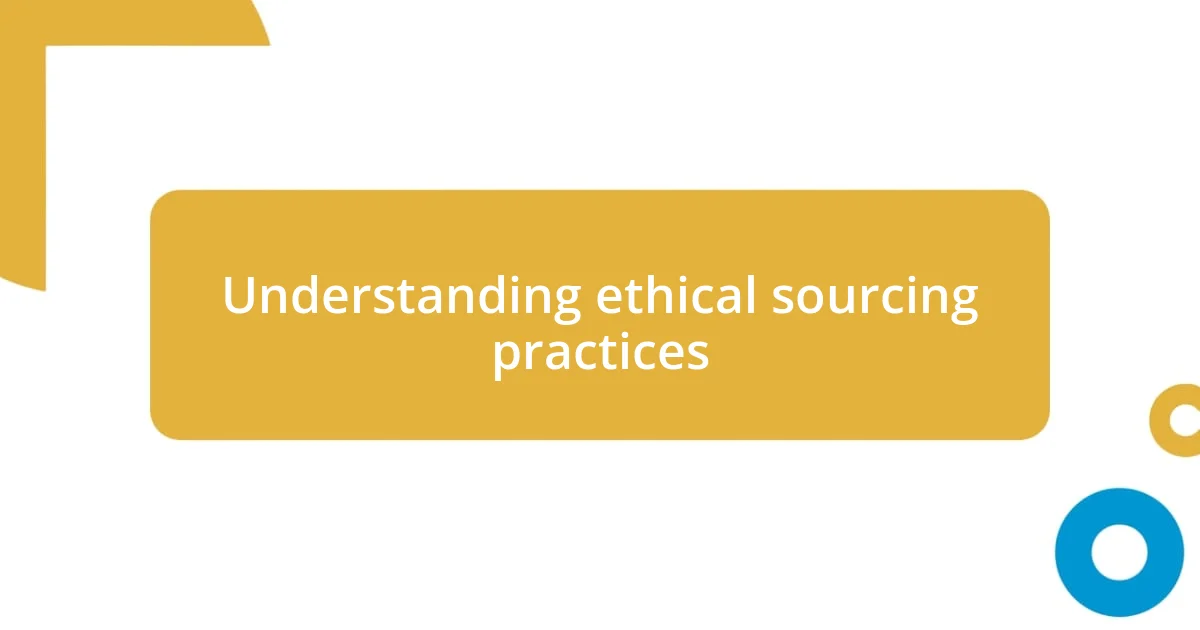
Understanding ethical sourcing practices
Understanding ethical sourcing practices is about being mindful of where and how products are made. It’s more than just a trendy phrase; it embodies a commitment to sustainability and respect for people and the planet. I often think about the coffee I choose—do I really know if the farmers are paid fairly?
Consider the impact of our purchasing decisions. For example, when I discovered that my favorite clothing brand was sourcing materials from unethical suppliers, it hit me hard. I felt deceived and realized my buying habits could either support or undermine ethical practices. This makes me wonder, how often do we stop to investigate the story behind our purchases?
Ethical sourcing practices not only promote fair labor conditions but also contribute to environmental sustainability. I remember a time when I visited a fair-trade chocolate factory. The pride on the workers’ faces as they shared how they benefited from direct trade relationships was inspiring. It made me realize that ethical sourcing practices create a ripple effect of positive change, ultimately benefiting consumers, producers, and the environment alike.
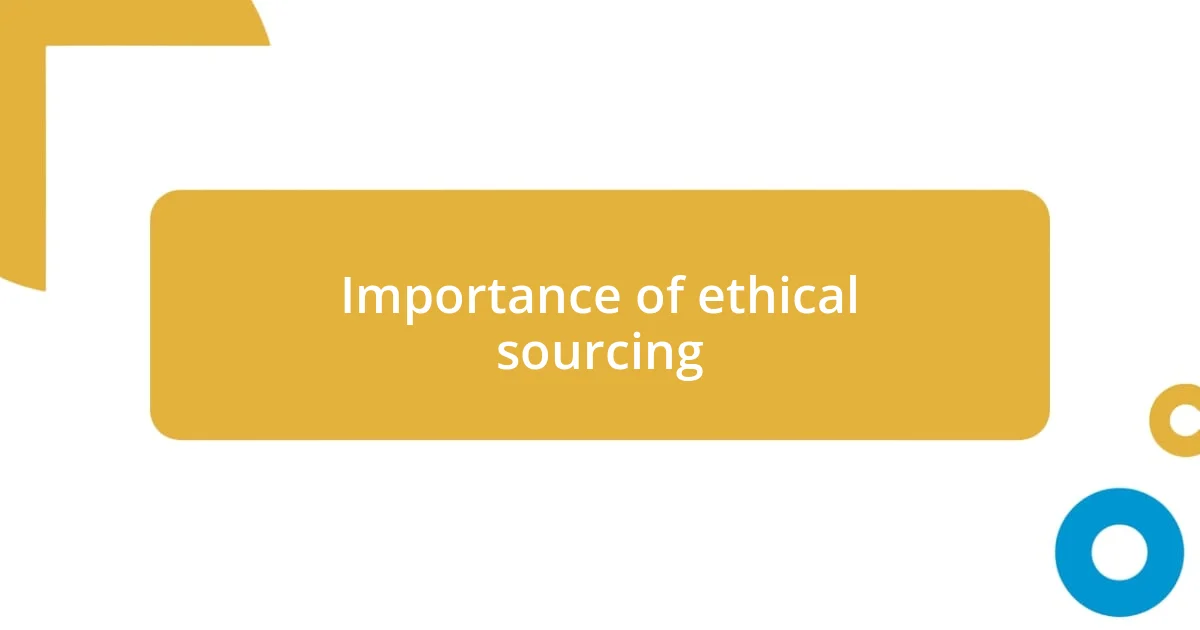
Importance of ethical sourcing
Ethical sourcing is vital because it builds trust between consumers and producers. I remember a conversation with a small-batch coffee roaster who emphasized how ethical practices not only improved the lives of farmers but also enriched the quality of the coffee. I began to appreciate how every cup of coffee I enjoyed was a result of someone’s dedication to their craft—making my morning ritual feel much more significant.
Moreover, ethical sourcing plays a crucial role in environmental protection. When I learned about sustainable fishing practices that not only preserved fish populations but also provided livelihood to coastal communities, I was moved. It made me reflect on my choices at the grocery store; every time I opt for products sourced with care, I contribute to the preservation of our planet and its diverse ecosystems.
Finally, the economic benefits of ethical sourcing can’t be overlooked. I once attended a seminar where a speaker highlighted how businesses engaged in ethical sourcing often outperform their competitors. This resonated with me; supporting companies that prioritize ethical practices not only leads to social good but can also drive long-term success for those businesses, creating a win-win situation for everyone involved.
| Aspect | Importance |
|---|---|
| Trust | Builds consumer confidence and loyalty |
| Environmental impact | Protects ecosystems and promotes sustainability |
| Economic viability | Supports long-term success for ethical businesses |
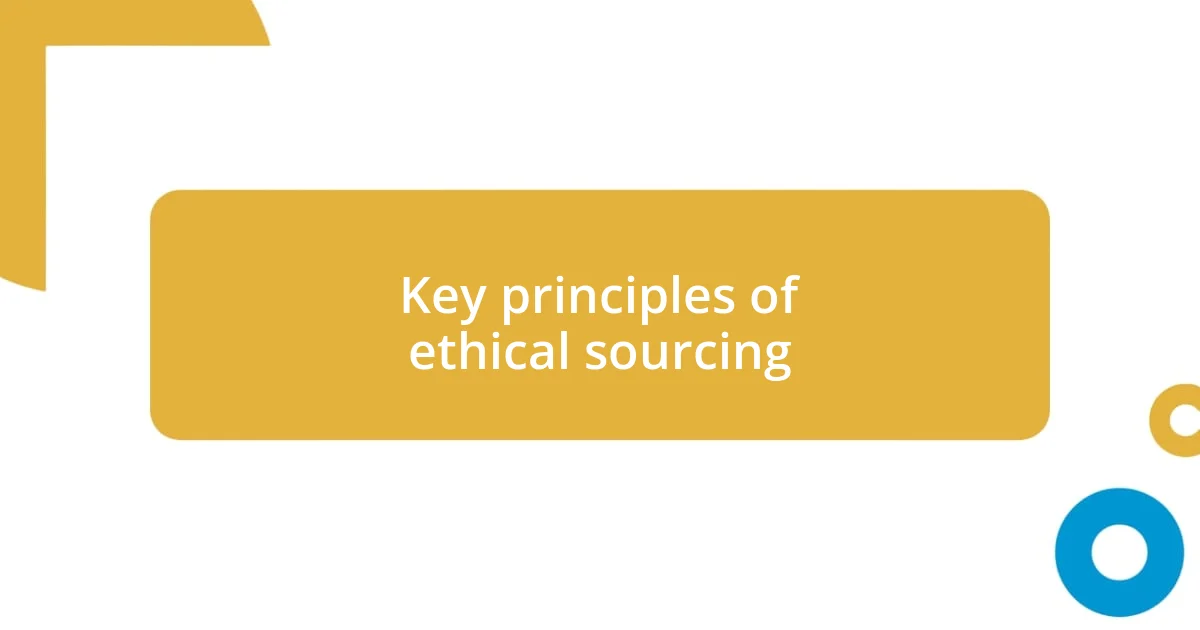
Key principles of ethical sourcing
Adopting key principles of ethical sourcing requires a commitment to various critical factors. One principle that stands out to me is transparency. Companies should be open about their supply chains, allowing consumers to see where their products come from and how they are made. I remember feeling a sense of relief when I found a brand that laid everything out clearly. It made me trust them more because they weren’t hiding anything.
Here are some fundamental principles of ethical sourcing to consider:
- Fair Labor Practices: Ensuring all workers receive fair wages and work under safe conditions.
- Transparency: Providing clear information about sourcing practices and supply chains.
- Environmental Sustainability: Minimizing ecological impact through responsible sourcing and production methods.
- Community Engagement: Supporting local communities and contributing to their development.
- Quality Control: Prioritizing quality over cost, reaffirming that ethical practices can lead to better products.
These principles, when upheld, create a fabric of integrity that consumers can truly resonate with. The moment I realized that the simple act of buying a product held the power to impact ethical practices worldwide was transformative for me. It deepened my engagement in ethical sourcing, reminding me that my shopping decisions can echo beyond my immediate world.
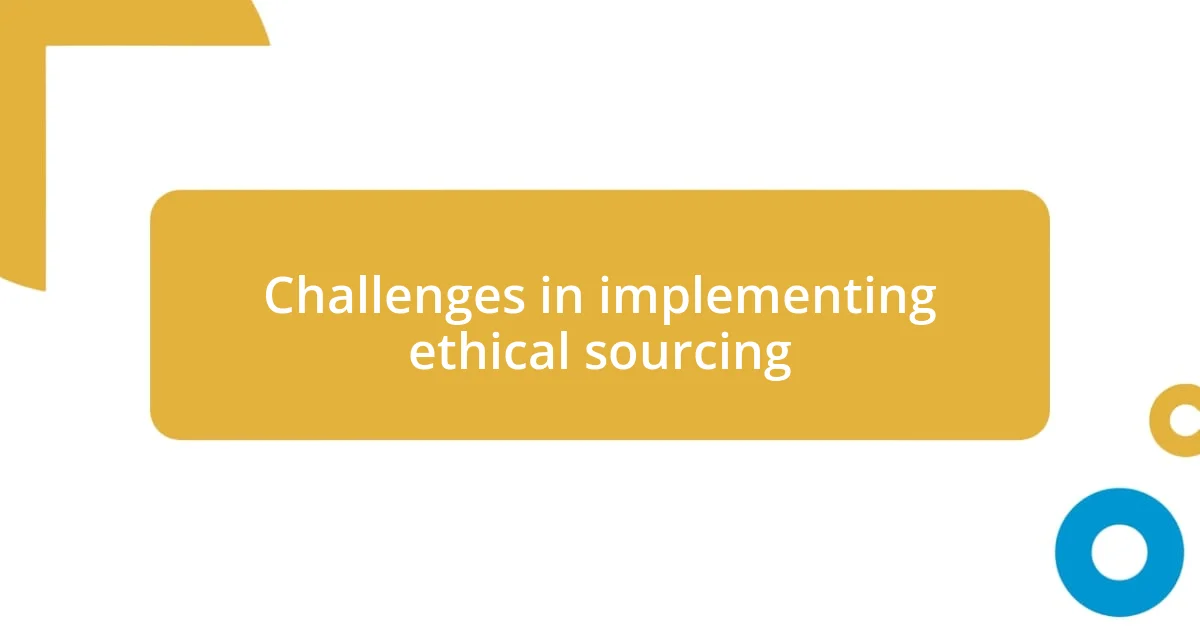
Challenges in implementing ethical sourcing
One of the biggest challenges in implementing ethical sourcing is the lack of transparency in supply chains. I’ve often found myself puzzled by where my favorite products come from, especially when companies are vague about their sourcing practices. It raises the question: how can we truly support ethical brands if we don’t have clarity on their practices?
Another hurdle is the potential increased cost associated with ethical sourcing. I recall discussing this with a friend who runs a small business. He lamented that while he wants to source ethically, the financial burden can be daunting. It makes me think—how do we balance the desire for ethical practices with the realities of staying competitive in the marketplace?
Lastly, measuring the impact of ethical sourcing can be complex. I remember hearing about a brand that claimed to contribute to local communities but faced scrutiny over its actual benefits. This made me reflect: how do we ensure that our purchases genuinely support positive change? It’s a nuanced challenge that requires continual evaluation and commitment to genuine ethical practices.
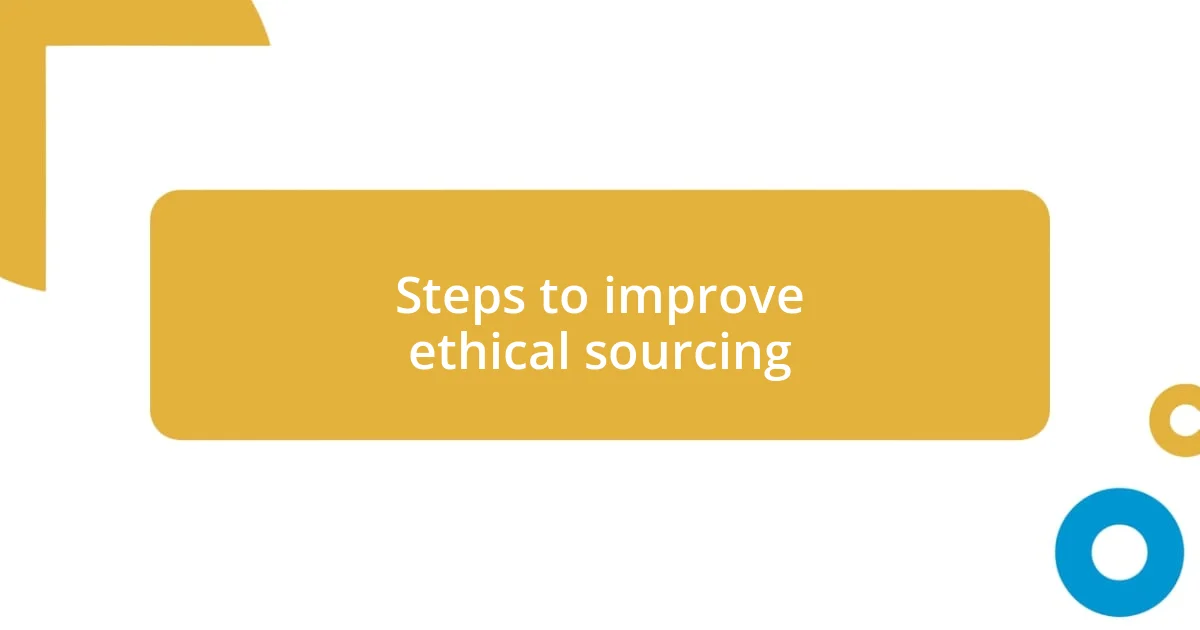
Steps to improve ethical sourcing
To enhance ethical sourcing practices, I believe the first step is to establish strong relationships with suppliers. I once attended a workshop where a successful retailer shared how visiting factories personally opened their eyes to the conditions workers faced. This face-to-face interaction built trust and led to meaningful changes, not just in the supply chain but also in the lives of those workers.
Next, conducting regular audits is crucial. I’ve seen companies that implement unannounced visits to their suppliers, which offers a clearer picture of the working conditions. It’s fascinating how a simple act of checking in can uncover issues that might otherwise go unnoticed. Aren’t we all responsible for ensuring those making our products are treated fairly? Regular evaluations can foster accountability and drive continuous improvement in ethical sourcing practices.
Finally, engaging consumers in the journey is vital. I remember the overwhelming sense of pride I felt when I came across a brand that actively encouraged its customers to share their sourcing questions on social media. It wasn’t just about selling a product; it was about creating a community that cares. Shouldn’t we all be part of this conversation about ethical sourcing? Involving consumers not only raises awareness but can also put pressure on brands to uphold their commitments.














